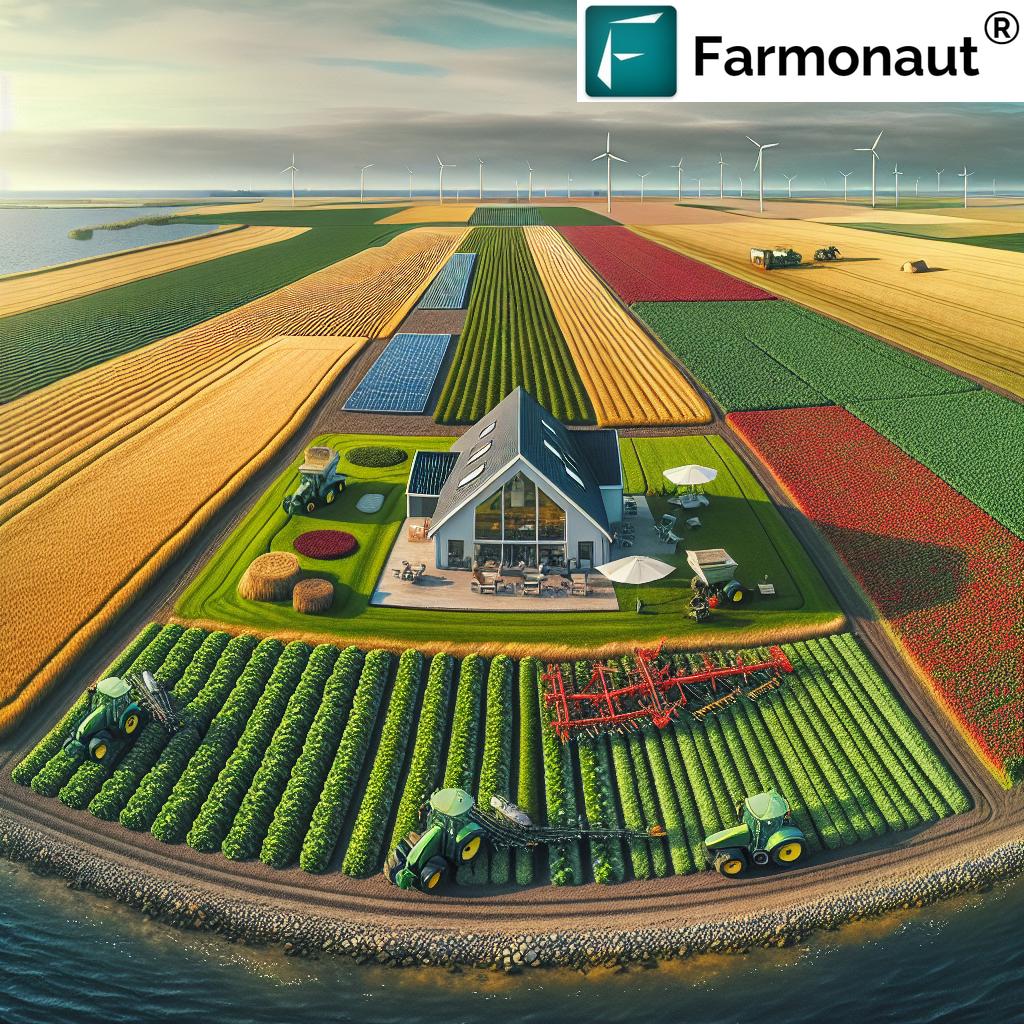European Agricultural Innovation: Sustainable Practices Shaping the Future of Arable Farming and EU Policy
“A visionary European agricultural leader manages a diverse 340-hectare farm on a Danish island, cultivating four main crops.”
In the ever-evolving landscape of European agriculture, sustainable practices and innovative approaches are taking center stage, reshaping the future of arable farming and influencing EU policy. As we delve into this transformative journey, we’ll explore how a prominent figure in the agricultural sector is leading the charge towards a more sustainable and efficient future for European farming.

The Visionary Leader: A Beacon of Agricultural Innovation
At the heart of this agricultural revolution is a visionary leader who manages a diverse 340-hectare farm on the Danish island of Falster. This farm serves as a microcosm of European agricultural innovation, cultivating a variety of crops including sugar beets, malt barley, wheat, and grass seeds. The farm’s success story is not just about yield; it’s a testament to the power of sustainable agriculture practices and innovative crop rotation techniques.
As we explore the intricacies of this farm, it’s crucial to understand how advanced technologies are shaping modern agriculture. Farmonaut, a pioneering agricultural technology company, offers satellite-based farm management solutions that align perfectly with these industry trends. Through its android, iOS, and web applications, Farmonaut is making precision agriculture accessible to farmers across Europe and beyond.
Crop Rotation: A Cornerstone of Sustainable Arable Farming
One of the key sustainable agriculture practices implemented on this Danish farm is crop rotation. This time-honored technique has been given new life through modern agricultural innovation. By systematically alternating crops in a specific order, farmers can:
- Improve soil health and structure
- Reduce pest and disease pressure
- Enhance nutrient cycling
- Increase biodiversity
- Optimize water use efficiency
The farm’s rotation cycle typically includes sugar beets, followed by malt barley, then wheat, and finally grass seeds. This carefully planned sequence ensures that the soil remains fertile and resilient, reducing the need for synthetic inputs and aligning with the EU’s Green Deal objectives for sustainable farming.
Sugar Beet Cultivation: Sweet Success in Sustainable Farming
Sugar beet cultivation on the farm exemplifies how traditional crops can be grown using modern, sustainable methods. The farm utilizes precision agriculture techniques, leveraging satellite imagery and data analytics to optimize planting, irrigation, and harvesting. This approach not only increases yield but also significantly reduces water usage and minimizes the environmental impact.
Farmonaut’s satellite-based crop health monitoring system plays a crucial role in such precision farming practices. By providing real-time data on vegetation health (NDVI) and soil moisture levels, Farmonaut enables farmers to make informed decisions about resource allocation, ultimately leading to more sustainable and profitable sugar beet production.
Malt Barley and Wheat: Balancing Tradition with Innovation
The cultivation of malt barley and wheat on the farm represents a perfect blend of traditional European arable farming methods and cutting-edge agricultural technology. These cereal crops are essential to the European agri-food sector, and their sustainable production is crucial for food security and economic stability.
Innovative practices implemented for these crops include:
- Precision seeding based on soil analysis
- Integrated pest management to reduce chemical inputs
- Use of cover crops to prevent soil erosion and enhance fertility
- Application of AI-driven irrigation systems for optimal water use
Farmonaut’s Jeevn AI Advisory System complements these efforts by providing personalized farm advice, weather forecasts, and expert crop management strategies. This AI-driven tool analyzes satellite data and other inputs to generate customized recommendations, helping farmers improve productivity while adhering to sustainable practices.
Grass Seed Production: Nurturing Biodiversity and Soil Health
The inclusion of grass seeds in the farm’s crop rotation cycle is a strategic move that goes beyond mere diversification. Grass seed production plays a vital role in:
- Enhancing soil structure and preventing erosion
- Supporting pollinator populations
- Providing habitat for beneficial insects
- Contributing to carbon sequestration
- Offering a valuable crop for livestock feed and turf industries
This aspect of the farm’s operations aligns perfectly with the EU’s biodiversity strategy and showcases how agricultural innovation can contribute to broader environmental goals.
“European agri-food cooperatives play a crucial role in supporting farmers across the continent, impacting millions of hectares.”
The Role of European Agri-Food Cooperatives
European agri-food cooperatives are pivotal in supporting farmers and driving sustainable agricultural practices across the continent. These cooperatives serve as a bridge between individual farmers and the larger agricultural ecosystem, providing:
- Access to markets and fair pricing
- Shared resources and technology
- Knowledge exchange and best practices
- Collective bargaining power
- Support in implementing EU agricultural policies
Our visionary farmer leader plays a significant role in these cooperatives, representing the interests of arable farmers and advocating for policies that support sustainable agriculture. This collaboration between farmers, cooperatives, and policymakers is crucial for addressing the challenges facing European agriculture and ensuring a resilient food supply chain.
Shaping EU Agricultural Policy
The influence of our Danish farmer extends beyond his own fields and into the realm of EU agricultural policy. Through his involvement in various agricultural organizations, he plays a key role in:
- Advocating for sustainable farming practices at the EU level
- Contributing to the development of the Common Agricultural Policy (CAP)
- Promoting the interests of arable farmers in policy discussions
- Encouraging the adoption of agricultural innovation across Europe
- Balancing economic viability with environmental sustainability
This engagement ensures that the practical experiences of farmers are reflected in EU policies, leading to more effective and implementable agricultural strategies.
Challenges Facing European Farmers
Despite the progress in sustainable agriculture practices, European farmers face numerous challenges:
- Climate change and extreme weather events
- Pressure to reduce environmental impact while maintaining productivity
- Market volatility and global competition
- Aging farmer population and succession issues
- Adapting to rapidly evolving technologies and practices
Addressing these challenges requires a multifaceted approach, combining innovative farming methods, supportive policies, and technological solutions. Farmonaut’s suite of tools, including its blockchain-based product traceability and carbon footprinting features, are designed to help farmers navigate these challenges effectively.

Agricultural Technology Trends Shaping the Future
The future of European agriculture is being shaped by cutting-edge technologies and innovative approaches. Some key trends include:
- Precision agriculture and data-driven decision making
- Artificial Intelligence and machine learning in farm management
- Drone technology for crop monitoring and spraying
- Vertical farming and controlled environment agriculture
- Blockchain for supply chain transparency and traceability
Farmonaut is at the forefront of these trends, offering solutions that integrate satellite imagery, AI, and blockchain to address various agricultural challenges. Their platform provides valuable services such as real-time crop health monitoring, AI-based advisory systems, and resource management tools, aligning perfectly with the needs of modern European farmers.
European Farm Management Strategies
Effective farm management is crucial for the success of sustainable agriculture practices. Our Danish farmer exemplifies several key strategies:
- Long-term planning and adaptive management
- Integration of technology for data-driven decision making
- Diversification of crops and income streams
- Collaboration with research institutions and industry partners
- Continuous learning and adoption of best practices
These strategies, combined with tools like Farmonaut’s fleet and resource management solutions, enable farmers to optimize their operations, reduce costs, and improve overall farm productivity.
The Impact of Agricultural Innovation on Rural Communities
The adoption of sustainable agriculture practices and innovative technologies has far-reaching effects on rural communities across Europe. These impacts include:
- Creation of new job opportunities in agri-tech sectors
- Improved economic stability for farming families
- Enhanced environmental stewardship and conservation
- Attraction of younger generations to farming
- Strengthening of local food systems and rural economies
By embracing agricultural innovation, rural communities can become more resilient and sustainable, ensuring their vitality for generations to come.
Explore Farmonaut’s API for advanced agricultural data integration
The Role of Research and Education in Advancing Sustainable Agriculture
Continuous research and education are essential for the advancement of sustainable agriculture practices in Europe. Key aspects include:
- Collaboration between universities and farming communities
- On-farm research trials and demonstration projects
- Development of specialized agricultural education programs
- Knowledge transfer through extension services and farmer networks
- Integration of traditional farming wisdom with modern scientific approaches
These efforts ensure that the latest agricultural innovations are effectively disseminated and implemented across European farms.
European Agricultural Innovations and Sustainable Practices
| Innovation/Practice | Description | Environmental Impact | Economic Benefits | Adoption Rate (%) |
|---|---|---|---|---|
| Crop Rotation | Systematic alternation of crops to improve soil health | Reduces soil erosion, enhances biodiversity | Improved yields, reduced input costs | 75 |
| Precision Agriculture | Use of technology for targeted farming practices | Optimizes resource use, reduces waste | Increased efficiency, higher profits | 45 |
| Organic Farming | Farming without synthetic inputs | Promotes soil health, reduces pollution | Premium prices, lower input costs | 8 |
| Integrated Pest Management | Holistic approach to pest control | Reduces chemical use, protects beneficial organisms | Lower pest control costs, healthier crops | 60 |
| Water Conservation Techniques | Efficient irrigation and water management | Reduces water usage, prevents soil salinization | Lower water costs, drought resilience | 55 |
The Future of European Agriculture: A Sustainable Vision
As we look to the future of European agriculture, the path forward is clear. Sustainable agriculture practices, powered by innovative technologies and supported by forward-thinking policies, will be key to ensuring food security, environmental stewardship, and rural prosperity. The example set by our Danish farmer and the contributions of companies like Farmonaut are paving the way for a more resilient and sustainable agricultural sector across Europe.
By embracing crop rotation, precision agriculture, and other sustainable practices, European farmers are not only improving their own operations but also contributing to broader environmental and social goals. The continued collaboration between farmers, cooperatives, policymakers, and technology providers will be crucial in addressing the challenges of climate change, resource scarcity, and global food demand.
Access Farmonaut’s API Developer Docs for seamless integration
Frequently Asked Questions
- What are the main challenges facing European farmers today?
European farmers face challenges such as climate change, market volatility, pressure to reduce environmental impact, aging farmer populations, and adapting to new technologies. - How does crop rotation contribute to sustainable agriculture?
Crop rotation improves soil health, reduces pest and disease pressure, enhances nutrient cycling, increases biodiversity, and optimizes water use efficiency. - What role do European agri-food cooperatives play in supporting farmers?
Cooperatives provide access to markets, shared resources, knowledge exchange, collective bargaining power, and support in implementing EU agricultural policies. - How is technology shaping the future of European agriculture?
Technologies like precision agriculture, AI, drones, vertical farming, and blockchain are revolutionizing farm management, improving efficiency, and enhancing sustainability. - What are some key sustainable agriculture practices being adopted in Europe?
Key practices include crop rotation, precision agriculture, organic farming, integrated pest management, and water conservation techniques.
As we conclude our exploration of European agricultural innovation and sustainable practices, it’s clear that the future of arable farming is bright. By embracing sustainable agriculture practices, leveraging cutting-edge technologies, and fostering collaboration across the agricultural sector, European farmers are well-positioned to meet the challenges of the 21st century. The journey towards a more sustainable and resilient agricultural system is ongoing, but with visionary leaders and innovative solutions like those offered by Farmonaut, the path forward is clear and promising.






